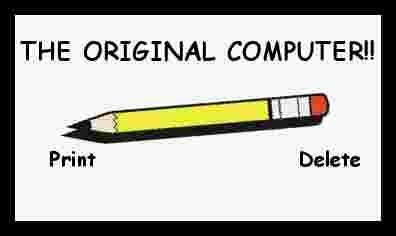Many people who use computers today talk about cut and paste, but years ago when I entered first grade, cut and paste required some small blunt scissors and a bottle of paste. Basically today's cut and paste is a process on the computer or smartphone where you can copy a picture or text and make that part of a new document you are putting together. It's a totally different procedure from the way I learned when scissors and a bottle of paste were actually used.

A semantic change refers to any change in the meaning of a word over the course of time, this column will tell about a few of those changes that are mostly related to computers and the technology that goes along with it.
Memory was information stored in your brain.
An application was for employment.
A CD had music on it.
A cursor used profanity.
A firewall was part of a building that kept a fire from spreading.
A hard drive was a long trip on the road.
A keyboard was on a piano.
A mouse was a small rodent.
A mousepad was where a mouse lived.
A program was a TV show.
A virus was the flu.
A web was what a spider made.
Other words we use, because of technology as well, have caused us to think about whether we mean the old way or the new way.
Block - to place in front of something OR to prevent someone from contacting you on social media.
Cloud - a visible mass of particles of condensed vapor OR any of several parts of the internet that allow online processing and storage of documents.
Cookies - something you eat OR a small text file sent to your computer by a website you have visited.
Footprint - a mark left by a foot or a shoe OR a unique set of characteristics that serve as a means of identification.
Follow - to go behind someone or something OR to subscribe to someone's updates on social media.
Like - to be agreeable to someone or something OR to be in agreement with a website's content.
Spam - a type of lunch meat OR unsolicited e-mails sent out in bulk.
Swipe - a type of criticism directed towards someone or an organization OR moving your finger across a touchscreen.
Tablet - a writing pad OR a general purpose computer contained in a touchscreen - I wrote an earlier column on the changes in tablets.
Text - a book or other piece of writing OR to send a text message.
Tweet - a bird's chirp OR a very short message to send on the Twitter website.
Viral - caused by a virus OR becoming very popular by quickly circulating through the internet.
There are still some other words that, although very old, still have the same meanings as they did many years ago.
Bailiwick - a person's own space or territory; the word bailiff comes from bailiwick
Bloviate - a person that when talking likes to ramble on, very similar meaning to the term blowhard.
Bumfuzzled - confused or flustered
Cattywampus - something that is in disarray
Comeuppance - get what's coming to you, usually meant in a negative way
Discombobulated - confused, a little more so than bumfuzzled
Donnybrook - a riot
Flibbertigibett - an unreliable, flighty person
Hullabaloo - a ruckus, a loud uproar
Lollygag - someone who is just messing around wasting time
Malarkey - talk that is foolish or insincere
Nincompoop - a foolish person
I've often heard that English is one of the hardest languages to learn; having spoken English all my life, naturally it doesn't seem that hard to me. However, trying to learn English as an adult, I imagine because of the many contradictions in the English language learning it could be very difficult. A very funny scene occurred on the old "I Love Lucy" television show when Lucy was trying to get Ricky to improve his way of speaking the English language. He was reading aloud from a book and as I remember it although the words had similar spellings the pronunciation was completely different with each word. I believe the words were bough, cough, dough, enough, and through. Seeing that list of words it's easy to see why so many people say the English language is confusing; read and red are spelled differently, but can sound the same depending on how they are used in a sentence. To, too, and two all sound the same but the meaning and spelling can be different depending on how they are used in a sentence. Also why are there many words that begin with a silent letter such as gnome or knife. Tthat first letter doesn't need to be there.
I've only touched on a very few of the MANY inconsistencies in the English language, however you may now know a little bit more about what people have in mind when they comment that the English language is a hard language to learn. I better close soon before I bloviate too much and get all discombobulated.
I imagine that from now on each generation as they become senior citizens will have to deal with different words, phrases, and terms from those they learned and used in early childhood. I know many things have changed from when I began school, in fact changes seem to be coming faster nowadays and it looks like that trend will continue.
If you have any comments or questions my e-mail address is deh63shs@yahoo.com.